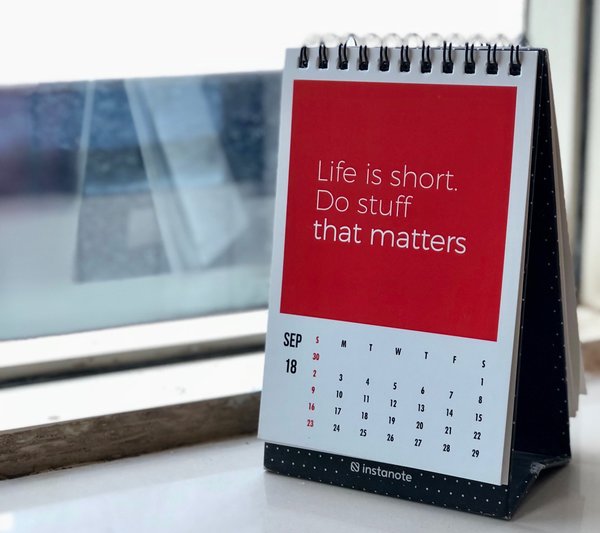 Some people are just…different.
Some people are just…different.
They seemingly have a gift to perform at superhuman levels.
No, it can’t just be their work ethic, because they don’t appear to be working at all.
It’s like they were born to put the rest of us to shame. They’re walking reminders of our deficiencies, models you can never hope to emulate…
Or can you?
Chances are, the people I described aren’t anything special. They weren’t born with genius IQ or some mutant gene in their DNA.
What they really have is focus.
And this kind of focus is what I’ll cover today.
An Unrelenting Focus
So what exactly is focus? And how does it relate to Going Great?
Well, I don’t have a dictionary with me, but I’ll describe the word as best as I can:
Focus is directed action towards a single goal.
That’s it man.
There’s no special feature or magical quality; it’s just disciplined action. And when this action is directed towards a great goal, you get something special.
But now that we have the concept of focus defined, let’s describe what focused people do:
Focused people use their energy to make work more attractive than distractions.
From this description, we can gather three traits of focused people:
- They make work attractive.
- They avoid distractions.
- They manage their energy.
Focused people perform all three actions to reach their goals. And if you want to do great work, you should do the same.
“So how do I actually do that?”
Good question. Those three points are a little vague.
That’s why I’ve listed three ways to perform each for a total of nine focus strategies below.
Making Work Attractive
Strategy #1: Remember the Reason
The easiest way to make work attractive is to remember how it relates to your goal.
You need to know the reason behind your work and think about that connection constantly.

Morale is a real thing. People who don’t form positive links to their work don’t do it well for long.
Visit any workplace in America for example, and you’ll see that the best workers understand how their role plays into the larger strategy.
The dull office work you see on TV is based on the (normally right) assumption that managers don’t share their vision with others. This leads to stress, tension, and conflict that would be avoided if workers saw the value in day-to-day tasks.
To use another example, my goal with the Going Great series is to ramp up my production and perform at a high level. Every post in the series contributes to that. So when I sit down after an eight hour workday when I’d rather take a nap, I remember my reason why, and proceed to go to work.
That’s the intrinsic motivation you need. You can read about focus all day, but it won’t help if you have no reason to care.
Strategy #2: Prepare Seriously
The quickest way to lose focus is to use it unprepared.
Focus is all about doing one thing at one time. But when you’re not prepared, you have to do everything before you narrow down.
Take me as a writer for example.
I have to write outlines before I start my drafts. Outlines help me arrange my thoughts beforehand and let me combine similar ideas the way I see fit.
Most times I need an hour or so to get one ready. It may look like I wasted time writing ten sentences and some bullet points, but this period is crucial to efficient writing.
When I prepare a detailed outline beforehand, I just have to put words on the screen. If I don’t make an outline, however, drafting becomes a painful task.
Not only do I have to write a draft that’s destined to be garbage, I also have to think, organize, and research at the same time. I can’t do all that for long of course, so this usually leads to a delay.
That’s the difference preparation makes.
Multi-tasking is for people who are fine with not performing their best. So instead of settling, make a schedule, plan your actions, and focus on one thing at a time.
Strategy #3: Draw Your Own Line
One of the great yet simple tricks I learned in college was to create my own deadline.
If I had an assignment due on Friday for example, I challenged myself to finish the Wednesday before.
Like I said, this is incredibly simple, but when you put it into practice, you’ll fall in love with your work. Doing this forces you to go beyond your comfort zone and think about problems ahead of time. It also gives you a buffer to perfect your work when you would otherwise scramble to finish.
Your confidence will soar when you do this because it grants a feeling of autonomy. You didn’t just meet the sorry deadline everyone else did. You took matters into your own hands and finished with time to spare.

Even if you work for yourself, you can still use the trick too. Just take your absolutely-must-finish-this-day deadline and move it closer.
Think of it like trying to lift a 20 pound weight. The best way to consistently lift it isn’t to practice with a 20 pounder. You should rather practice with a 30 pound weight so that the 20 is easy later.
Avoiding Distractions
Strategy #4: Choose the Right Environment
The best way to avoid distractions is to choose the right environment.
We humans are easily influenced by our surroundings, and we often allow them to dictate how we behave.
If we enter a room where people talk, we talk too. And if we enter a quiet room, we don’t say a word.
So if you want the easiest path to success, work where everyone else does the same thing:
- If you sing, find a place where people sing.
- If you need to study, find a place where people study.
- And if you play a sport, find a place where people seriously practice that sport.
Yes, this sounds like common sense, but people try to write or study in communal areas all the time. They get mad at others for not letting them focus but don’t realize they’re in the wrong place.
Please don’t be like them. Remember that the environment will always dictate surrounding behavior.
Case in point, I’m in the library now and a lady across from me just went psycho on a dude for talking too loud.
Yeah, you can’t make this stuff up.
Strategy #5: Embrace Active Silence
I’ve never understood why people use meditation to focus.
Personal bias against the practice aside, it just doesn’t make sense.
Why would you empty your mind when focus is the goal? That’s a backward way of doing things.
You don’t want to silence your thoughts; you want to silence the outside world.
Focus is about directing your thoughts toward a specific goal, and to do that, you have to keep other thoughts from invading.
This is why I’ve started using active silence—which is a cool way of saying that I turn stuff off.
If I’m headed to the library, I’ll turn off the radio or any music I have and enjoy the ride. Then it’s just me, my thoughts, and the road.

Active silence is a simple practice but you’d be surprised how much it helps. Most of us love to jump in the car and shift into autopilot. We blast music the whole time and waste a perfect opportunity to focus.
This active silence isn’t limited to your car rides though. You can take any routine task before work and do it in silence. Just mute the TV, silence your phone, and embrace the quiet.
Strategy #6: Face Your FOMO
The fear of missing out.
It’s the binding force behind entertainment and social media. It keeps you addicted to movies, shows, and social posts even when the content is less than stellar:
- Everyone saw that new movie, so you need to see it too.
- If you neglect going out with your friends, they’ll probably disown you.
- And if you don’t like your sister’s post, she’ll think you secretly hate her.
This fear of apparent disaster will paralyze you. It’ll keep you glued to post after post, and show after show until you don’t have any time left to work.
This is why you need to go blind. It’s the only way to cure a bad case of this fear.

Make a pledge to avoid entertainment and other non-essential media for a week. Then see how much you can focus. Just make sure to tell others beforehand so that there are no bad feelings.
If people need to reach you, they can do it directly, but focus is too precious to waste on pics of your friend’s afternoon snack.
Remember the larger goal at hand and ask yourself if the things you’re so afraid of missing will help accomplish it.
And if people don’t have the decency to talk to you about something important, I’d question if you’re really missing out at all.
Managing Energy
Strategy #7: Keep it Natural
This one is counter-intuitive, but it’s best to avoid stimulants to improve your focus.
I’m biased here as a caffeine-sensitive guy whose had some painful overdoses, but I truly believe that avoiding stimulants will lead to better focus.
Sure, if you want a short-term boost then by all means grab your coffee and the energy drinks. But for the long-term, that energy is not sustainable. Those stimulants just trick your body into a fight-or-flight response, and this eventually takes its toll on you.
You want sustainable focus, not crashes. So instead of relying on a substance, do things the old fashioned way, and train your mind to do what you want.
Yes, mental discipline is hard, but bodybuilders didn’t achieve their form overnight, and you won’t build mental strength quickly either.

It’s a long process. But it is one that leads to improvement:
- Your two hours of focus will soon turn into four.
- Instead of crashing, you’ll only be fatigued.
- And you won’t need any stimulants because your mind will have greater capacity.
Your body was made to adapt like this. All you have to do is train it properly.
Strategy #8: Practice Sexual Discipline
The sex drive is a powerful thing.
Misuse it, and you’ll get in a lot of trouble. But use it wisely, and you’ll achieve more than ever.
Many people are slaves to their sexual desires—just watch the news if you need proof of that—but this doesn’t mean you have to stoop to their level. In fact, focus demands that you don’t.
Your body has a built-in system to energize you, yet most people gladly forfeit their strength for a few minutes of pleasure.
That’s one reason why you have to discipline your sexual desire. It’s hard to do great things when your mind is consumed with lust.
Look, I know sexual discipline is tough—I haven’t been perfect here by any means—but I challenge you to make abstinence your goal.
Don’t be casual about something so strong. Embrace your sex drive as good and healthy, and then channel it towards a greater purpose.
Strategy #9: Use Purposeful Rest
Wanna know a great way to maintain high energy?
Don’t fall asleep.
No, I’m not saying you shouldn’t sleep at all. What I’m saying is that you shouldn’t fall asleep.
In other words, don’t just let your eyes close; rest with purpose instead. Have a plan for when you’ll sleep, how long you’ll do it, and what you’ll do as soon as you wake.
“I’ll go to bed at 9, wake up at 5, and hit the shower as soon as my alarm goes off.”
That’s how you should treat sleep.

This whole post is about getting serious about your work, so why not be serious about how you recharge every night?
Make your bed as comfortable as possible, remove all sources of light, and try using a sleep mask (trust me, it does help).
Feel free to expand this purpose to more than just overnight sleep too. You should treat naps the same way and make sure you truly rest during your breaks.
I know working 24/7 sounds cool when you’re motivated, but it won’t do your body any favors. So work, take breaks, recharge, and repeat.
Just do everything you can to take care of yourself.
Stay Focused and Do Great Things
So that is how you focus.
I apologize for the lack of magic tricks, but I promise, you don’t need them.
All of these strategies are simple enough; the execution is what’s hard. So instead of reading about them here, why don’t you go try ’em out?
I’ll be back with more in this series when you’re done.
-Drew
(Note: This article contains an affiliate link. If you follow the link and make a purchase, I will receive a small commission at no extra cost to you.)
Other Posts in the Going Great Series:
- The Decision to Be Great: Introducing the Going Great Series (Going Great #1)
- Eyes Fit for a King: 3 Steps to Avoid Pornography so You Can Do Great Things (Going Great #3)
- The Ego-less Servant: How to Provide Irresistible Value with None of the Headache (Going Great #4)
- Uncanny Perseverance: 5 Common Threats to Greatness and How to Survive in Spite of Each (Going Great #5)
- A Light in the Dark: Why You Need a Heart for the Underground to Do Great Things (Going Great #6)
- An Ever-Present Help: How to Connect to the Source of All Things Great (Going Great #7, the Finale)
Hi Drew, I’m so thankful I stumbled upon your posts. Wow what a great “accident!”
I believe God had me find you, I was searching the internet for change scriptures in the Bible and there you were! Your posts are helping me make good changes in my life. So, thank you!
I pray that God continues to bless your mind to write and help others to be a better person.
Thank you Trina, that’s encouraging to hear.
I know writing and teaching are two things God put me here to do, so I try to help others through those actions as best as I can.
It’s awesome to hear that the work is paying off.